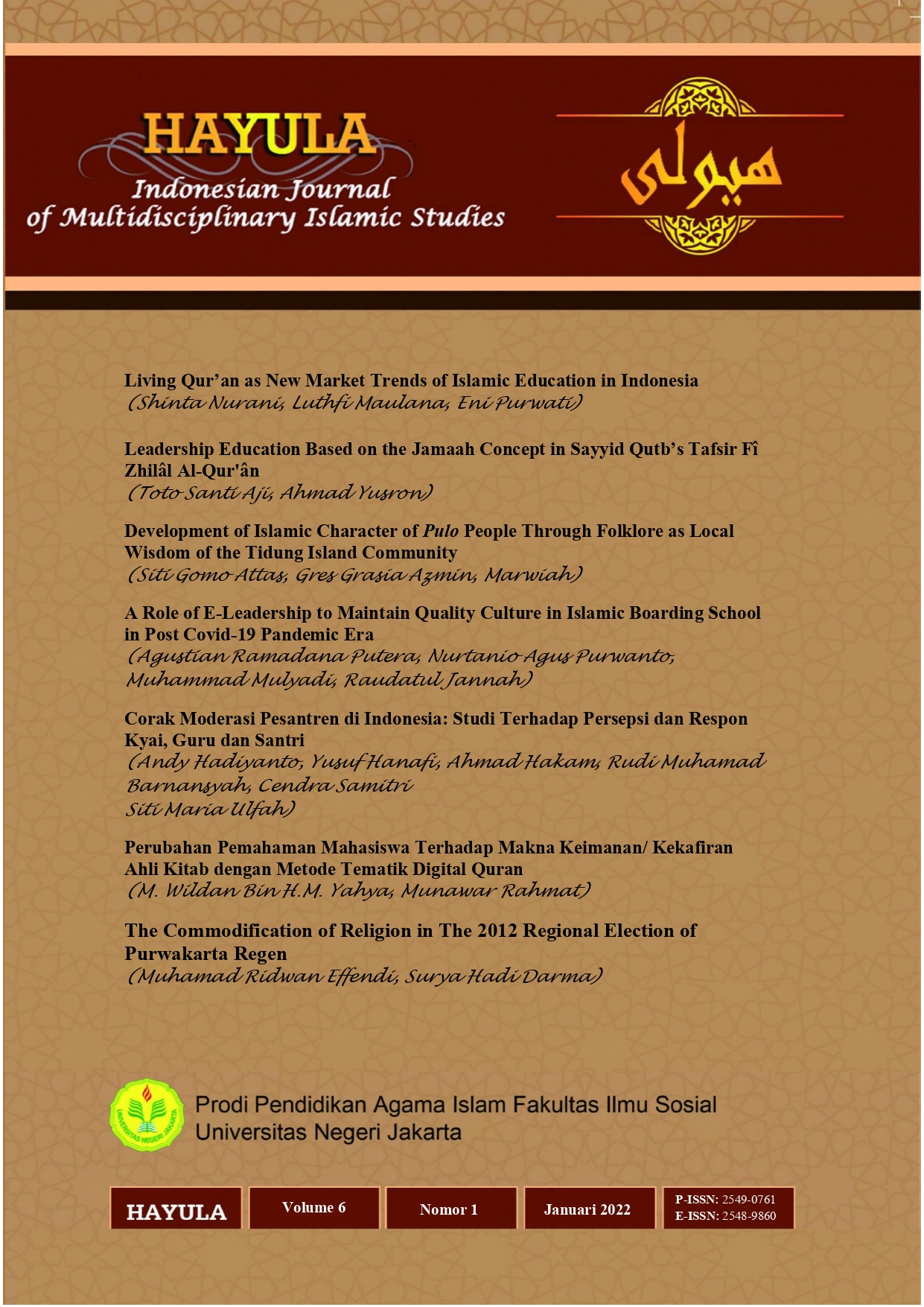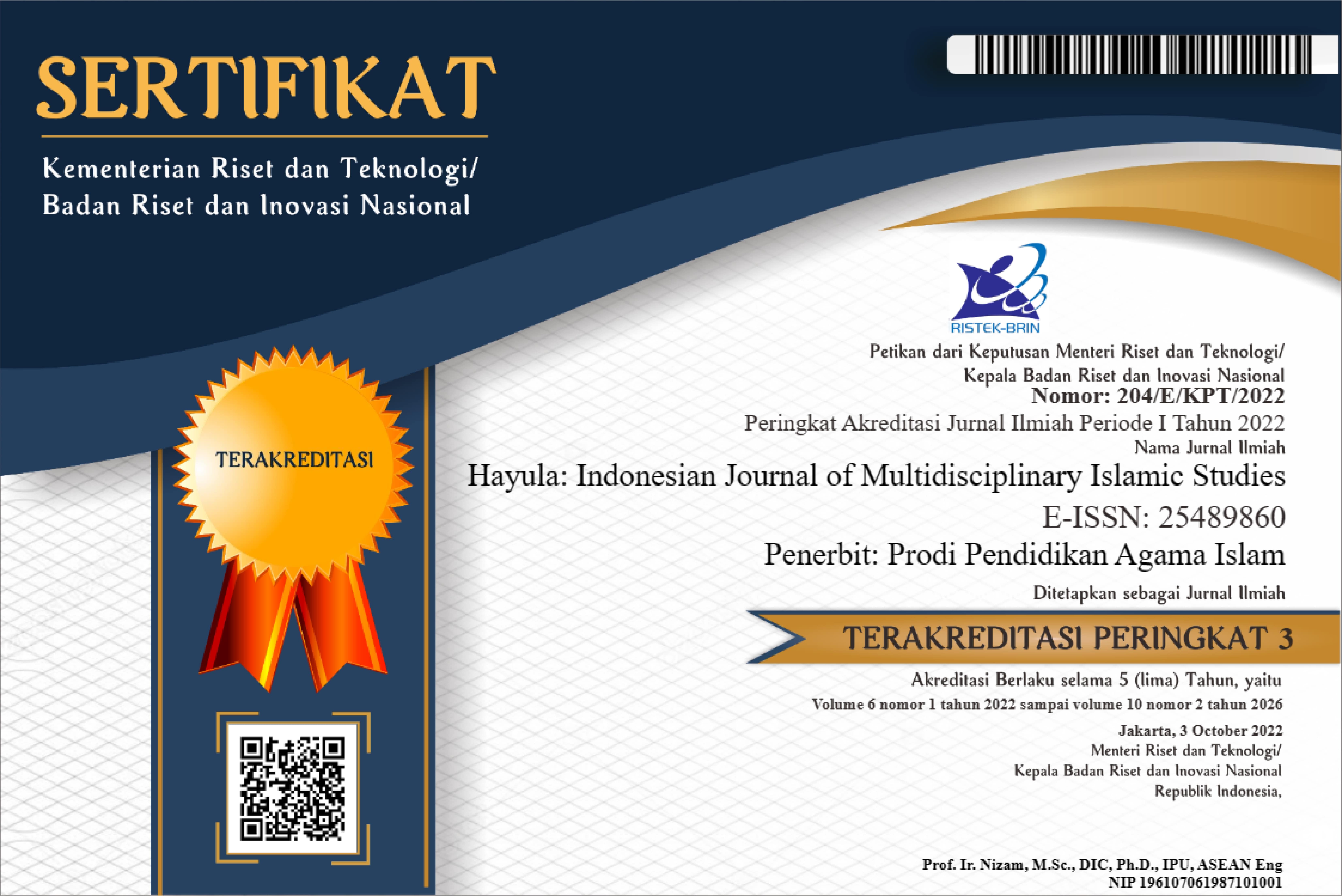Moderation Patterns of Pesantren in Indonesia: A Study on the Perceptions and Responses of Kyai, Teachers and Santri
DOI:
https://doi.org/10.21009/hayula.006.01.05Keywords:
pattern of moderation, sincere religiousity, Indonesian islamic civilization, moderate pesantrenAbstract
Religious moderation is actually an effort to restore understanding and application of religious teachings that are sincere, friendly, and oriented towards improving the quality of life and humanity. The realization of religious moderation is expected to further strengthen the role of religion as the spirit of civilization. Pesantren as one of the oldest religious educational institutions in Indonesia, from the beginning has played a role in creating Indonesian Islamic civilization with its characteristics that are open, tolerant, and humanist. Thus, pesantren is an Islamic educational institution that has long played a role in mainstreaming moderation in Indonesia. In line with that, this study seeks to dig deeper into the mode of religious moderation that is maintained in the pesantren environment based on the perceptions and roles of the main elements of the pesantren, such as kyai, teachers, and santri. This study uses a qualitative approach by conducting a literature study and documentation of partners which can be used as a valid data source. Theoretically, the mode of religious moderation in pesantren can be seen from theological aspects, sharia, state politics, and relations with others. The results show that the manifestation of religious moderation in the theological aspect which is manifested by the aqidah ahlussunnah wal Jama'ah (aswaja), is related to the problem of human and God relations, the limitations of Mu'min Kafir, and the position of reason and revelation. In the Sharia aspect, religious moderation appears in the acceptance of mu'tabarah schools of jurisprudence, although there are still Shafii schools and reject mixing (talfiiq). In the aspect of state politics, religious moderation of kyai, ustaz, and santri can be seen in their acceptance of the Unitary State of the Republic of Indonesia (NKRI) and Pancasila as the basis of the state, and in them against the politicization of religion. As for the relationship with the moderating attitude of pesantren exponents from their acceptance of the concept seen as different attitudes and readiness to blend in without having to negate each other and lose their identity.
References
Abdullah, M. (2019). Mengurai Model Pendidikan Pesantren Berbasis Moderasi Agama: dari Klasik ke Modern. Prosiding Nasional: Bargaining Pesantren di Era Revolusi Indsutri 4.0 Vol. 2 . Kediri: Pascasarjana IAIN Kediri.
(1995). The Encyclopedia of Religion. In M. Eliade. New York: Simon dan Schuster.
Effendi, M. R. (2020). Mitigasi Intoleransi dan Radikalisme Beragama di Pondok Pesantren Melalui Pendekatan Pembelajaran Inklusif. Paedagogie, I (I), 55–74.
Fauzi, A. (2018). Moderasi Islam, untuk Kemanusiaan dan Peradaban. Jurnal Islam Nusantara Vol. 02 No.02, 234.
Laili, K. (2018). Metode Pengajaran Pesantren dan Perkembangannya. Al-Iman: Jurnal Keislaman dan Kemasyarakatan, 70.
Miswari, Z. (2007). Al-Quran Kitab Toleransi: Inklusivisme, Pluralisme, dan Multikulturalisme. Jakarta: Fitrah.
Munir, A. (2020). Pendidikan Moderasi Beragama dalam Kurikulum Pesantren. Bengkulu: Penerbit CV. Zigie Utama.
Nasution, H. (1986). Teologi Islam: Aliran-Aliran, Sejarah dan Analisa Perbandingan. Jakarta: UI Press.
Nursyam, R., & Fadhil, A. (2018). Jalan Menuju Tuhan: Revitalisasi dan Interpretasi Makna atas Penciptaan Karya Tari Shirath Nan Tersirat. Hayula: Indonesian Journal of Multidisciplinary Islamic Studies, 2(1), 81-102.
Qustulani, M. (2019). Hakikat dan Konsep Moderasi Beragama. In M. Qustulani, Moderasi Beragama: Jihad Ulama Menyelamatkan Umat dan Negeri dari Bahaya Hoax (p. 21). Tangerang: PSP Nusantara Press.
Ronny Mahmuddin, S. (2020). Qadariyah, Jabariyah Dan Ahlussunnah (Studi Komparatif Merespon Kebijakan Pemerintah Dan Fatwamui Dalammencegah Penularan Covid-19). BUSTANUL FUQAHA: Jurnal Bidang Hukum Islam Vol. 1, No. 2, 2.
Sjadzali, M. (2003). Islam dan Tata Negara Ajaran, Sejarah, dan Pemikiran. Depok: UI Press.
Yasid, A. (2010). Membangun Islam Tengah. Yogyakarta: Pustaka Pesantren.
Downloads
Published
How to Cite
Issue
Section
License
Authors who publish with this Journal agree to the following terms:
- Author retain copyright and grant the journal right of first publication with the work simultaneously licensed under a creative commons attribution licensethat allow others to share the work within an acknowledgement of the work’s authorship and initial publication of this journal.
- Authors are able to enter into separate, additional contractual arrangementfor the non-exclusive distribution of the journal’s published version of the work (e.g. acknowledgement of its initial publication in this journal).
- Authors are permitted and encouraged to post their work online(e.g. in institutional repositories or on their websites) prior to and during the submission process, as it can lead to productive exchanges, as well as earlier and greater citation of published works.
Users/public use of this website will be licensed to CC BY







